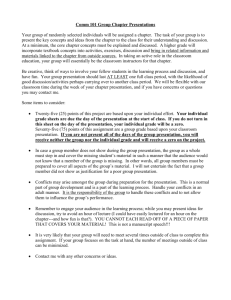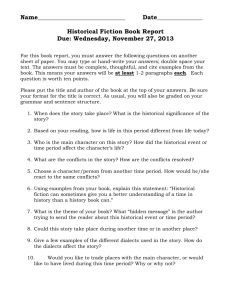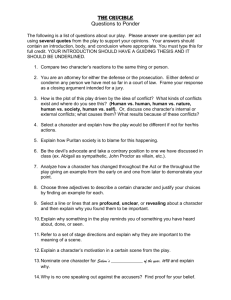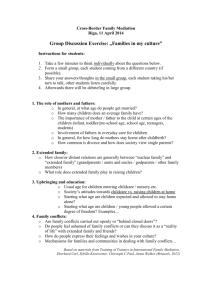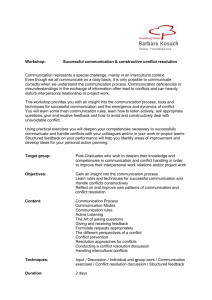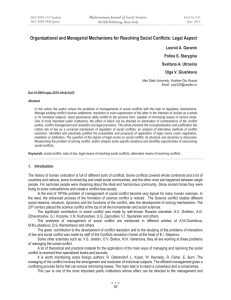The role of a health and social care worker?
advertisement
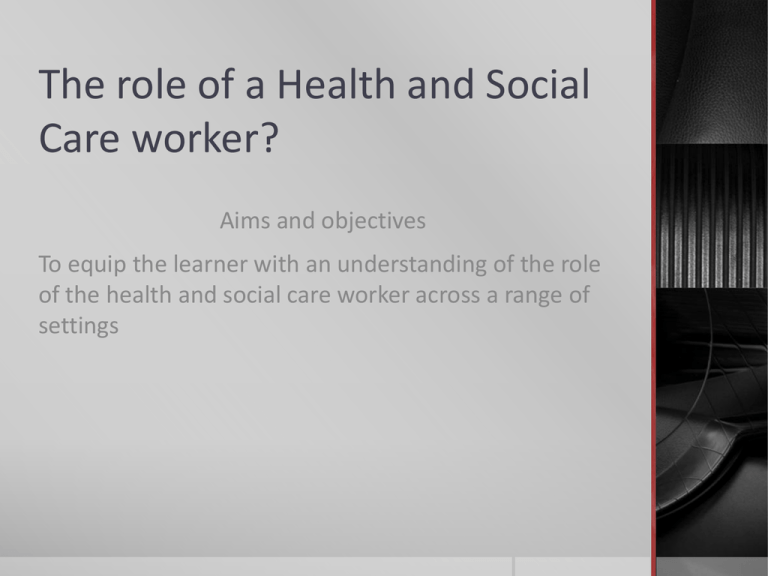
The role of a Health and Social Care worker? Aims and objectives To equip the learner with an understanding of the role of the health and social care worker across a range of settings Places of employment Residential and nursing homes for the elderly Home care Day centres Support workers for people with learning difficulties Hospitals Residential colleges for adults/young people with learning difficulties Mental health Role and responsibilities– Task sheet 1 List your role and responsibilities as a health and social care worker Please use the examples listed for guidance and complete the following: Communication, Health and safety, Duty of care, Policies and procedures, service users health and wellbeing, personal / professional development. Responsibilities Responsible for delivering a quality service to the person you are supporting Work in ways that the employer expects you to Be able to work safely and responsibly Comply with the Code of Practice for Social care Workers Be able to work in partnership with other professionals and with family and friends Definition of relationships (the free dictionary definition by Farlex) 1. The condition or fact of being related, connection or association 2. Connected by blood or marriage 3. A particular type of connection existing between people related to or having dealings with each other 4. A romantic or sexual involvement. With whom might we have a personal relationship? Partner Personal relationships Family members Friends With whom might we have a professional relationship?-fill in the boxes task sheet 2 With whom might we have a professional relationship? Client Managers Work colleagues Client family Other professionals Describe the differences between professional and personal relationships- Task sheet 3 Professional Personal Task sheet 4 Read the following statements and identify which statements are appropriate or not in work/ personal relationships. Shouting , arguing , swearing Then explain your reasons below in the box provided. Accepting gifts Recording activities Texting friends Appropriate dress wear Homework 1 Describe the different working relationships in your setting. End of power point 2 What do we mean by “agreed ways of working” and how do we do this? Task sheet 5 How do you know how to carry out your role and responsibilities when commencing a new job, or job role or a change in your daily responsibilities. Record where you would find this information Why is important to adhere to the above. Task sheet 5 continued Record where you would find this information Why is important to adhere to the above? What do we mean by “agreed ways of working” and how do we do this? Policies and procedures Job descriptions Care Plans Risk Assessments Supervisions and Appraisals Why is it important to adhere to agreed ways of working To ensure that clients receive a quality service To ensure that they and the people you work with are safe To ensure that you maintain boundaries To safeguard yourself and your clients form harm and abuse End of power point 3 What are the main principle of partnership working? Respecting and valuing others Communicating and sharing information Agreeing objectives Partnership working Making decisions Resolving conflicts Determining roles and responsibilities Complete task 6- Explain why it is important to work in partnerships with others End of section 4 What types of conflicts are there Conflicts within a team Between colleagues Conflicts involving a client Conflicts between client and family members Conflicts between clients in a group living environment. Task sheet 8 Complete the following scenario and describe what you would do A client is slipping down her chair. You ask your colleague to get the hoist to reposition the client. Your colleague says” we will just pull her up the chair, it will be quicker than getting the hoist” How then can we work well Agree a common purpose and work Value everybody's ideas and towards it opinions Build relationships with team members Build relationships with clients Mutual respect Communicate well Learn whatever you can B prepared to listen Always look for the positives in people Task sheet 8 Identify skills and approaches needed for resolving conflicts Examples of conflict How can you resolve these? Where can you get support? Where you can get support Your manager Other members of staff Other professionals Outside agencies CSSIW General Social Care Council Training provider Home work 2 Make a list of all the different types of conflicts you may come across and explain approaches you have used to resolve these.

